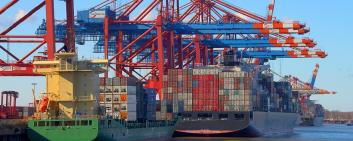Ms. Leister, taking a look back: has it become more difficult to export, to grow internationally?
It has now become easier to open up global export markets. A reduction of trade restrictions as well as free trade agreements make a significant contribution to this. Furthermore, the megatrend of digitization facilitates communication with business partners and information procurement. The expansion of the global transport system ensures improved product availability. However, increasing geopolitical risks and destabilization along with its associated currency distortions prove not to be conducive.
Are you noticing a trend towards more protectionism now – specifically in your business, beyond the political debate?
The Leister Group operates in market niches worldwide with its products and is barely exposed to increasing protectionism. Generally speaking, we are affected by politically motivated trade embargos, which influence demand in the respective country or make cross-border transactions more difficult. Furthermore, in China, we see measures being to protect Chinese industry with cyber sovereignty. Isolated systems for e-commerce, video streaming and online search make it difficult for foreign companies to gain market access.
Have you ever decided against approaching a new market because the trade barriers seemed insurmountable?
Since our foundation in 1949, we have already tapped into more than 100 countries as sales markets with subsidiaries and distributors. As soon as a country in which we are not yet represented has market potential, i.e. it gains the required purchasing power and political stability, we begin to develop the market. Our current activities focus on Southeast Asia and in particular Africa. Trade barriers have never stopped our strategy; except in Argentina, where we stopped our exports due to new import restrictions.
Where in the world is market entry particularly difficult?
In our experience, entering the market is challenging in all countries. We establish ourselves through our world-renowned brands Leister, Weldy and Axetris, our quality products and digital presence. We process international key accounts from Switzerland and set up local distributors. This way, we have locally trained professionals for sales and service and garner knowledge about the local conditions. The intercultural skills of our employees in Switzerland, who speak more than 10 languages, are valued by our customers around the world.
As a company, how do you go about tackling a new market or taking the next growth step in this market?
We open up new markets as early as possible. First, we use the internet to assess market potential, evaluate customer requirements and market structures. Next, our employees visit trade fairs in the country and get an idea of the potential. We then exhibit our equipment at trade fairs, and try to find customers and distributors this way. To some extent, we also work with experts from S-GE. Developing and supporting competent distributors is important for successful growth.
Do you use free trade agreements, and how important are they for you?
We use free trade agreements wherever possible. In particular, the associated tariff reductions, transparency and legal certainty with other regulations make it easier for us to cultivate the market and make our products more competitive.
What would be your main tips for SMEs when it comes to growing internationally?
Develop markets one after the other, and not at the same time. Each country requires knowledge and effort in terms of language, legislation, product specifications, applications, distribution channels, etc. Therefore, focusing on the largest and most easily accessible market potential is important. Cooperation with major customers and the establishment of distributors, who are familiar with the country’s conditions, should be the first steps for successful market development.
Your view of the future: do you think globalization will intensify? Or will global trade become more limited?
Globalization, with its increasingly global division of labor, has led to many goods being produced where the location conditions are most favorable. This has benefited all stakeholders, businesses, consumers and entire economies. The focus of the international economic system is shifting. Asia will become more and more important in the future. This requires open markets and free trade, which must overcome the burgeoning market access barriers.
About Christiane Leister
After completing a degree in economics, Christiane Leister began her career with controlling & finance in well-known industrial companies. In 1993, she took over a sole proprietorship in succession and expanded it globally with new technologies to form the Leister Group. Christiane Leister is a member of the following committees: ETH Board, Board of Directors Amphasys AG, Strategic Advisory Board Artmyn SA, Advisory Board Venture Foundation and the Jury Swiss Economic Award.
About the Leister Group
With 800 employees and an export share of 98%, the Swiss technology group Leister AG has been active in over 100 countries for almost 70 years. Leister Technologies AG is the world leader in plastic welding equipment and modules for industrial process heat. The product range of Axetris AG, a Leister Group company, consists of gas sensors and micro-optical components.
Do you want to know more about free trade agreements and trade barriers to export? Meet Christiane Leister and other interesting speakers at the Aussenwirtschaftsforum on April 26 at Messe Zurich.
Read more on this subject in our dossier: International growth – between globalization and protectionism






